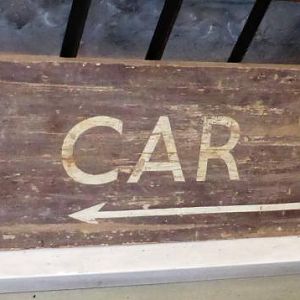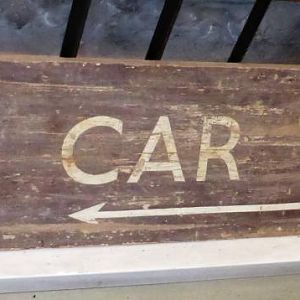-
Our booking engine at tickets.railforums.co.uk (powered by TrainSplit) helps support the running of the forum with every ticket purchase! Find out more and ask any questions/give us feedback in this thread!
Search results
-
R
Dangerous practice - propping
Hi, I am writing some new interpretation for Newton Abbot Town & GWR Museum. We have a 1922 warning notice, which appears to be quite common, ours made during James Milne's tenure as GM, although the order dates from Felix Pole's time: "Warning is given against the dangerous practice of...- RSC Friends
- Thread
- Replies: 2
- Forum: Railway History & Nostalgia
-
R
Churn
Oddly, I scanned a photo of the sign at Churn Halt into the Railway Studies Collection archive in Newton Abbot library on Wednesday. It looked a peaceful spot in the picture with just open fields behind the sign. I speculated it was just a halt to load milk churns?- RSC Friends
- Post #9
- Forum: Railway History & Nostalgia
-
R
Newtons Traction Maintenance Depot's Hooter
Thanks for the information and insights. There is a photo attached of the hooter. I have read about Swindon's double hooter - Ours was a smaller - and so less famous. Size counts in the world of hooters! I don't think the museum volunteers include an expert in compressed air - but I will ask...- RSC Friends
- Post #9
- Forum: Railway History & Nostalgia
-
R
Newtons Traction Maintenance Depot's Hooter
Hi, I am working on some new interpretation for Newton Abbot Museum's GWR Room. We have the hooter that used to sound at Newton's Traction Maintenance Depot. Does anyone remember hearing it? What did it sound like, how often did it sound? And any other similar useful memories would be good...- RSC Friends
- Thread
- Replies: 8
- Forum: Railway History & Nostalgia
-
R
Last broad gauge through Newton Abbot
Thanks Taunton - so the last train Down, Iron Duke, would also be the last one Up, but returning without passenger carriages or empty, on the way to Swindon. I have Tiny covered, thanks, also a recent find, a photo of John Lethbridge, the relief stationary engine man who worked on Tiny.- RSC Friends
- Post #3
- Forum: Railway History & Nostalgia
-
R
Last broad gauge through Newton Abbot
I am writing new interpretation for the railway room at Newton Abbot Museum. Would I be right in saying the last Down broad gauge engine to stop at Newton Station in May 1892, was Iron Duke on The Cornishman from Bristol, and the last Up was Amazon from Penzance. And did they cross at Dawlish?- RSC Friends
- Thread
- Replies: 2
- Forum: Railway History & Nostalgia
-
R
explain gradients
Thanks Taunton, I can use this working knowledge. Off topic reply: NA Museum has a piece of atmospheric pipe, a visually accurate, but technically imperfect, running model of the atmospheric railway, a full size Brunel image (take your photo next to the man), as well as a letter from him...- RSC Friends
- Post #50
- Forum: Infrastructure & Stations
-
R
double-headed over South Devon Banks
Thanks for the direction on the correct terminology edwin_m, and for the link to the geograph site, John Webb.- RSC Friends
- Post #7
- Forum: Photography Sites, Blogs & Videos
-
R
double-headed over South Devon Banks
That's a kind offer, Ash Bridge thanks, but I was hoping for an older picture showing double-headed steam traction - the point I am trying to make to our museum visitors is about the reason for the importance of NA as the stabling point for the banking engines.- RSC Friends
- Post #3
- Forum: Photography Sites, Blogs & Videos
-
R
double-headed over South Devon Banks
Hi, I am writing new interpretation for Newton Abbot Museum's GWR Room. I have been leaning heavily on the goodwill of Forum members - and now want more. Does anyone have a good shot of a double-headed working - patently in Newton Abbot Station - or distinctively on the South Devon Banks, I...- RSC Friends
- Thread
- Replies: 6
- Forum: Photography Sites, Blogs & Videos
-
R
explain gradients
Thanks John Webb, I will look up that book in the Railway Studies Collection.- RSC Friends
- Post #27
- Forum: Infrastructure & Stations
-
R
explain gradients
Can anyone direct me to a clear drawing of the gradient profile of the South Devon Banks, please? I have access to the Railway Studies Collection in Newton Abbot, and it has most books, or a website? Thanks- RSC Friends
- Post #24
- Forum: Infrastructure & Stations
-
R
Car train or Motorail at Newton Abbot
See attachment to see the sign in person!- RSC Friends
- Post #11
- Forum: Railway History & Nostalgia
-

To Car Train
- RSC Friends
- Media item
- Comments: 0
- Album: Car Train
-

Car Train
Brown sign, white lettering 'To Car Train' , white feathered arrow- RSC Friends
- Album
- Comments: 0
-
R
explain gradients
Yeh, see, you've lost me again! I have what I need. Over and out and thanks- RSC Friends
- Post #11
- Forum: Infrastructure & Stations
-
R
explain gradients
Thanks EM2. so it could be feet or metres. I get that.- RSC Friends
- Post #4
- Forum: Infrastructure & Stations
-
R
explain gradients
Newton Abbot Museum: Explaining the need for extra engines at NA: Sorry to be dumb, but if a track gradient is 1:32 (Dainton Bank) how do I explain that to a child? Is it metric? If not, how do I convert it to something a metric child would understand? Thanks- RSC Friends
- Thread
- Replies: 64
- Forum: Infrastructure & Stations
